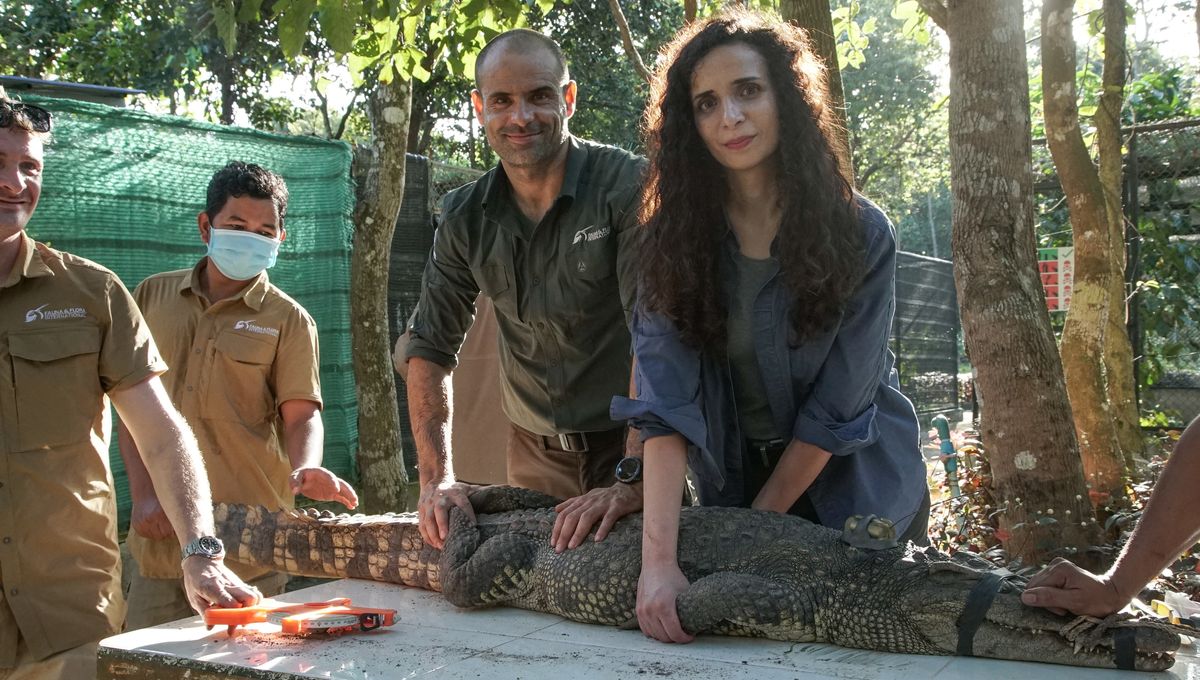
This article first appeared in Issue 11 of our free digital magazine CURIOUS.
Jetting off to remote locations, getting up-close and personal with rare and endangered wildlife, and motorbiking a few Siamese crocodiles in baskets: it’s all a day in the life for National Geographic Explorer, presenter, stand-up comedian, and palaeoanthropologist Ella Al-Shamahi. Exploring is something that anyone can do almost anywhere, but the prospect of doing it for a living seems like a childhood dream. So, it got us thinking, how do you become a professional explorer?
Al-Shamahi recently returned to our screens for series two of Our Changing Planet, a BBC documentary that aims to track the rewards of efforts made by scientists and local conservationists fighting to protect the planet and the species living on it at a critical time in Earth’s history. Series one saw Al-Shamahi trek into Cambodia’s Cardamom Forest, and for series two she ventured to the Mekong and rode across rough terrain to relocate endangered reptiles with hopes of establishing a new and thriving wild population.
We caught up with Al-Shamahi to find out what exploring is really like when the cameras are switched off, and how one goes about becoming a professional explorer. Spoiler alert: it takes more than a good Indiana Jones hat.
What’s it like being an explorer?
Ella Al-Shamahi: The thing with exploration is it takes many different forms. I was just with a friend over the weekend who works out in the Cook Islands, and she lives there, that’s how she does it. Whereas I live in London and then I do expeditions, whether they’re kind of TV adventures or more hardcore stuff.
Whatever form it takes, it means you get a front row seat to some exceptional, extraordinary places, people, stories, information, and science. It really is a privilege to be able to see that. I’m very, very lucky that I often get to see “off the beaten track” stuff. You also get to see parts of the world that have been really affected by conflict. It’s incredible to see that there are people trying to protect biodiversity and do science, meanwhile, they’ve got this trauma of decades of war.
Any downsides?
EA: It is really, really incredible, but I can get tired from the travel sometimes, just the practical components. Sometimes I’m like, “I need more vitamins,” but I think that happens to everybody. We’re all just tired.
How did you get into it?
EA: I was interested in evolution because I came from a creationist background, so I actually started off not really believing in evolution. And as I started getting deeper into it, I was quite interested in Yemen, which is where my family comes from, because I knew some really interesting scientific questions could be had with regard to human evolution and Yemen specifically.
I was also doing stand-up comedy and had actually gone off to film school to learn how to make ethnographic and documentary films, because I really wanted to be behind the camera. I had no interest in being on camera, but I wasn’t very good behind camera. I was good at being a producer but I was bad at being the director.
Subscribe to our newsletter and get every issue of CURIOUS delivered to your inbox free each month.
Then people started saying to me, “stop messing around, you do science, you do comedy, why don’t you be a TV presenter?” At the same time, the National Geographic Society sent me a letter asking me to be one of their explorers, which was really cool. Around a year or two later I got my first show, which was one I had been pitching.
So, it was quite a varied journey?
EA: Yeah, I think it’s a good example of why you should try and experiment with lots of things. When I first started out, I definitely had a lot of people saying “why are you doing stand up?” or “why are you doing film? Just focus on science, don’t be silly.”
I was passionate about comedy, I thought it was really good for my mental health and I just found it really enjoyable. I also found filmmaking really interesting, so I did it. I think if you’re interested in something, even if it doesn’t make sense in the natural mix of what you’re doing, just go for it. Don’t let people tell you what works as a career.
Has being an explorer made you a better storyteller?
EA: I think it’s definitely made me more fun in the pub. We always have these jokes amongst us, and not just explorers, to be fair, like war journalists as well, that we’ve all got our war stories. And when we say that we mean like, crazy stories. And we get a kick out of knowing how to tell those stories, they’re just so bonkers.
But I think at the same time, it’s a real responsibility as well. Like, what’s the point in me going to incredible places if I’m not doing something productive with it, because that’s just a holiday, right?
There has to be a purpose to it. There has to be something that you’re trying to do to help or to communicate. So, I’d say it’s definitely given me the stories that make me an interesting storyteller at times. But it’s also a responsibility.
If you’d like to see Al-Shamahi doing what explorers do best, series two of Our Changing Planet is available on BBC iPlayer now.
CURIOUS magazine is a digital magazine from IFLScience featuring interviews, experts, deep dives, fun facts, news, book excerpts, and much more. Issue 14 is out now.
Source Link: How Do You Become A Professional Explorer? We Asked One To Find Out